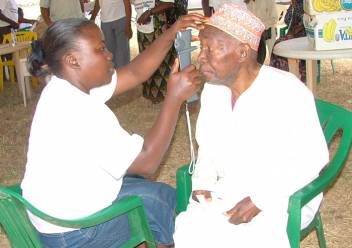 In the first half of 2012, HelpAge International and Ifakara Health Institute embarked on a study to uncover the burden of non-communicable diseases (NCD) among older Tanzanians. The study has now been completed and the analysis of results is in progress. However, I am writing to share the preliminary findings of the study.
In the first half of 2012, HelpAge International and Ifakara Health Institute embarked on a study to uncover the burden of non-communicable diseases (NCD) among older Tanzanians. The study has now been completed and the analysis of results is in progress. However, I am writing to share the preliminary findings of the study.
The study was conducted through a survey and focus group discussions held with older people, care givers and healthcare workers in Kibaha (rural) and Morogoro (urban) districts of Tanzania.
It brings out some interesting but contrasting perceptions of the relationship between older people and healthcare workers. It also raises the question of whether the practices in healthcare institutions are at odds with community values.
Lack of healthcare
The study shows older people’s frustration at the lack of proper care from healthcare workers. Older people are often unsure about how to pay for treatment. Some older people also commented on the negative attitudes they experienced from healthcare workers.
A carer in Kibaha said: “My father is the main advisor in the family and yet he is not given the same respect when he visits the hospital.”
Another carer commented: “You struggle to get to the hospital on a motorcycle, sleep on the bench waiting, and when you get there the doctor says, ‘where is the money?’. When you say you don’t have any, you are thrown out.”
Medicines unavailable
Another complaint was that medicines, apart from Panadol, are unavailable. An older man in Morogoro said: “When you go to the clinic the health worker continues to write, without looking at you. After five minutes they give you a piece of paper and tell you to go and take Panadol.”
While there were these negative comments, there were also positive ones about the attitudes of some of the healthcare workers. One older man said: “Health workers are attentive; they will listen and prescribe medicines.”
The study also brings out the views of healthcare workers who can find themselves caught between a large case load and a lack of medicines.
To manage their work, healthcare workers said they now assign at least one healthcare worker for older people. They also indicated that when medicines are running out, they reserve some for older people.
Allocating time for older people
One health worker said: “After the training, I planned to see them [over 60s] twice a week – Wednesday and Friday from 1:00 to 5:00 pm so that I get the time to talk to them. If they come in the morning I’m very busy.”
Several reports and studies carried out in Tanzania provided evidence that NCDs are indeed a growing problem in Tanzania. In 2005, the World Health Organization estimated that around 20% of deaths in Tanzania were due to NCDs.
The Tanzania National Strategy for Non Communicable Diseases of 2009-2015 indicates that NCDs with the greatest impact are cardiovascular diseases, cancers (particularly cervical and breast), central nervous systems diseases, diabetes and chronic respiratory diseases.
A study by the Tanzania Healthcare and Career Awareness Program (TAHECAP) in 2004 found that 60% of older patients at the Muhimbili hospital were admitted due to sudden loss of consciousness resulting from diabetes mellitus, hypertension and cerebral vascular diseases.
Lack of awareness of NCDs
Most of the patients were admitted at a late stage and as a result showed further complications such as diabetes, sexual dysfunction, renal failure and coronary artery diseases. The study also found that many older people die at home due to a lack of awareness of the symptoms and signs of hypertension, diabetes and heart attacks.
As the research analysis is still on-going, I am hoping to share some of the recommendations. It is also worth mentioning that there are examples of age-friendly health services in some districts ranging from additional funding from district councils to special days, consultation rooms and reception windows dedicated for older people.
In the meantime, I will leave on a positive note that the significant progress made by Tanzania in reducing mortality in children under five to 108 per 1,000 live births in 2010, from 162 in 2009 will be replicated.
The growing problem of NCDs should receive more attention through a life course approach to health and enable older people to enjoy equitable, non-discriminatory, appropriate and age-friendly healthcare.
Read more about work on health and non-communicable diseases.
